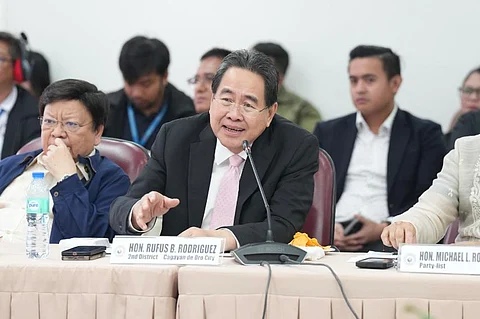
- NEWS
- the EDIT
- COMMENTARY
- BUSINESS
- LIFE
- SHOW
- ACTION
- GLOBAL GOALS
- SNAPS
- DYARYO TIRADA
- MORE

A House leader expressed strong objection to the Senate’s plan to proceed with the Barangay and Sangguniang Kabataan Elections (BSKE) as scheduled in December this year, asserting that pushing through will not only leave the incumbent local officials short-term but will also hurt government resources.
Cagayan de Oro Rep. Rufus Rodriguez made the protest on Tuesday in response to Senate President Chiz Escudero’s announcement that the Legislative-Executive Development Advisory Council (LEDAC) is eyeing to push the BSKE this year, as previously announced by the Commission on Elections (Comelec).
The final date, however, is still up to the discretion of Congress. The Senate and the House of Representatives must reconcile the disagreeing provisions of the needed bill. The BSKE was postponed to 1 December instead of coinciding with the 12 May midterm polls.
The Senate’s version of the bill, approved in January, seeks to defer this year’s BSKE to October 2027 and extend barangay officials’ terms from three to four years. The House’s version, on the contrary, aims to move the BSKE to May 2029, extending the tenure to six years. The measure is awaiting final reading.
According to Rodriguez, pushing the BSKE in December will leave the incumbent officials, elected in October 2023, a “very short term of two years, preventing them from timely and fully implementing their campaign plans, programs, and activities for their constituents.”
But above all, he stressed that the government will have to spend another P8 billion for BSKE, on top of the billions of pesos already spent in the recently concluded midterm elections.
“We have just spent tens of billions on the May 12 vote for senators, members of the House of Representatives, and provincial, city, and town officials. An additional of at least P8 billion is estimated to be expended for the BSK balloting,” he said. “Such a huge amount would go a long way if spent [on] barangay development projects.”
Former vice president Leni Robredo voiced similar concerns during her courtesy call to Escudero on Monday, emphasizing that two years is simply too short.
"If the [BSKE] will push through, the term would be too short. I just think that the current barangay officials will not be given enough time to fulfill their work, the promises they made during the campaign, and to implement their plans,” Robredo said.
Escudero said the consensus reached during the LEDAC meeting last week, presided over by President Marcos Jr., was to proceed with BSKE in December, with the barangay officials’ term extending to four years.
"If the Senate and House don’t take any action, the existing law will not be followed, and the election will proceed. The Senate and House need to act either to postpone the election or to fix the term," Escudero averred.
The Comelec is receptive to the idea of moving this year’s BSKE to 2026, saying this would provide them ample time to prepare. Nevertheless, the poll body said it is up to Congress to decide whether or not to push for a reset.
Rodriguez suggested that House Speaker Martin Romualdez should do the negotiations with the Senate, fulfilling his pledge to block this year’s BSKE, and proposed a six-year term for BSK officials.
The BSKE was postponed four times from 2016 until 2023, with the first three occurring under the Duterte administration. Proponents of the House bill posit that extending the tenure of barangay officials from three years to six years will deter the recurrence of this practice in the future.
